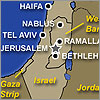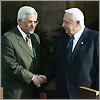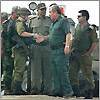Wednesday, July 02,
2003

BETHLEHEM, West Bank The
ancient city of Bethlehem (search) was turned over to the
Palestinians Wednesday afternoon after both Israeli and
Palestinian leaders promised painful concessions in order to
end the violence that has plagued their region for nearly
three years.
Palestinian police moved into the town with
sirens blaring. Bethlehem was the second area handed over by
Israel under a U.S.-backed Mideast peace plan. Israeli troops
pulled out of Gaza late Sunday.
Residents clapped as a column of police in
dark blue uniforms marched from their barracks toward the
center of town.
Palestinian Prime Minister Mahmoud
Abbas (search) said Tuesday that the turnover
of Bethlehem and Gaza by the Israelis would be "followed by
pullbacks from the rest of the cities and towns and
Palestinian refugee camps."
Abbas and Israeli Prime Minister
Ariel Sharon (search) held a summit Tuesday, at which
the two leaders hammered out the details of the plan to
withdraw Israeli troops from those areas and to hand over the
town after the last of the Israeli soldiers left. On Tuesday,
army transport trucks hauled equipment away from two Israeli
bases next to the town.
Meanwhile, the United States announced a
$30 million aid package on Wednesday for the West Bank and
Gaza Strip to repair Palestinian infrastructure damaged by
Israeli military actions, Reuters reported.
Jeffrey Feltman, acting U.S. consul-general
in Arab East Jerusalem, said the aid went "hand in hand" with
the Palestinian Authority's "aggressive pursuit of an
ambitious reform agenda" as required by the U.S.-backed "road
map" peace plan.
At a barracks near a derelict helipad,
laughing Palestinian police tried on their uniforms. Nearby, a
special forces officer barked orders at recruits in green
camouflage and bright red berets as they practiced marching in
a courtyard.
"Today, we're restoring our leadership in
one city in this land," their commander, Hani Deek, said. "I
hope the rest will soon follow."
However, as long as Bethlehem remains
encircled by Israeli checkpoints, residents don't expect the
handover to change much.
"They are making fools out of us," said
Jaudat Joude, who has been unable to reach his job at a
Jerusalem welding factory since the uprising began almost
three years ago. "If you want to make some serious changes,
open the roads, remove the checkpoints and let people in to
work. Then maybe we can believe that the Israelis have good
intentions."
Israeli forces have occupied Bethlehem
several times in the past three years, once holding the Church
of the Nativity under siege for a month, demanding surrender
of Palestinian gunmen who had fled inside the shrine that
marks the traditional birthplace of Jesus.
After a suicide bombing on a Jerusalem bus
on Nov. 21, carried out by a Palestinian from Bethlehem,
soldiers went back in and stayed.
The military said Tuesday that Israel would
be in charge of security of Israelis, including settlers in
nearby villages, while Palestinian security forces committed
to preventing "terrorist attacks in the areas under their
responsibility."
A similar formula held in Gaza.
Tuesday's summit was the first time Sharon
and Abbas spoke before reporters and cameras at a Jerusalem
summit, their third in six weeks. The atmosphere was cordial
and friendly.
Palestinian and Israeli Cabinet ministers,
some of them enemies until recently, sat at a table next to
the two podiums, chatting and smiling. That established a
relaxed setting for conciliatory language not heard in the
region during three years of bloodshed.
"Even if we are required to make painful
compromises, I will be willing to make them for the sake of
true peace -- a peace for generations, the peace that we all
yearn for," Sharon said.
Abbas responded in kind: "Enough suffering,
enough death, enough pain. Let us stride forward with courage
and without hesitation to the future we all deserve."
Both premiers committed themselves to the
"road map" peace plan President Bush launched at a June 4
Mideast summit with Sharon and Abbas. The plan leads through
three stages to the creation of a Palestinian state in
2005.
Abbas and Sharon, joined by senior Cabinet
ministers and aides, then withdrew for two hours of talks
aimed at resolving disputes over the next moves.
They agreed to bring back committees that
were set up during the first years of peace efforts in the
1990s to discuss issues including security, prisoners and
legal matters, according to officials on both sides. The
committees were suspended during the current violence.
Abbas also asked for freedom of movement
for Palestinian leader Yasser Arafat, who has been confined to
his West Bank headquarters by Israel for more than a year.
Sharon said he would consider allowing Arafat to move to Gaza,
but a senior Israeli official, speaking on condition of
anonymity, said it would be a "one-way ticket."
The Palestinians have made so much progress
that the Bush administration may resume direct aid to the
Palestinian Authority -- with a big boost to help strengthen
its security forces.
White House spokesman Ari Fleischer said
Tuesday that "circumstances have changed" and specifically
pointed to the Palestinians' new finance minister, Salam
Fayad.
Left behind in Ramallah as Abbas traveled
to Jerusalem, Arafat told reporters, "We hope that they will
continue with implementation of the road map plan, which means
complete withdrawal from all Palestinian lands."
However, there were many misgivings and
suspicions left over from previous failed attempts to stop the
violence and move toward peace.
The chief of Israel's Shin Bet security
service, Avi Dichter, said Tuesday that Israel would withdraw
from other West Bank towns only if Palestinian police begin
disarming Hamas, Islamic Jihad and other violent groups in the
Gaza Strip.
"We will not move on to transfer
responsibility for the West Bank before it becomes totally
clear that in Gaza the process of disarming terror groups has
begun," Dichter told a symposium at Tel Aviv University.
Abbas opposes the use of force against
militias because he fears it could trigger a civil war. He
suggested Tuesday that illegal weapons would not be
confiscated, but that Palestinian police would try to persuade
militiamen not to use them.
The Associated Press contributed to this
report. | 





